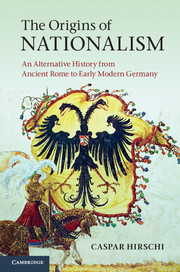Book contents
- Frontmatter
- Contents
- Figures
- Preface
- 1 Introduction
- 2 The modernist paradigm: strengths and weaknesses
- 3 Foundations of a new nationalism theory
- 4 Killing and dying for love: the common fatherland
- 5 Competing for honour: the making of nations in late medieval Europe
- 6 The nationalist transformation of borders and languages
- 7 Humanist nationalism
- 8 A German Emperor for the German people
- 9 Nation and denomination
- 10 Conclusion
- Bibliography of works cited
- Index
Preface
Published online by Cambridge University Press: 05 June 2012
- Frontmatter
- Contents
- Figures
- Preface
- 1 Introduction
- 2 The modernist paradigm: strengths and weaknesses
- 3 Foundations of a new nationalism theory
- 4 Killing and dying for love: the common fatherland
- 5 Competing for honour: the making of nations in late medieval Europe
- 6 The nationalist transformation of borders and languages
- 7 Humanist nationalism
- 8 A German Emperor for the German people
- 9 Nation and denomination
- 10 Conclusion
- Bibliography of works cited
- Index
Summary
Preface
In 1963, the political scientist Kalman H. Silvert edited an anthology on nationalism in ‘developing countries’ with the slightly awkward title Expectant Peoples. The book did not receive much attention at the time and has been long forgotten, despite the fact that it made Silvert a pioneer in the field of nationalism studies. In his foreword, Silvert introduced a new question, which would later be raised repeatedly without ever being answered conclusively. The question was: how to justify ‘yet another book on nationalism’?
If an author of the early 1960s had to give reasons for a new contribution to the study of nationalism, how severe must the pressure be now, after hundreds, if not thousands more books have been published in the meantime? The answer probably has to be ‘very severe indeed’. No author will be able to escape the pressure. However, this is no bad thing. There are still good arguments to justify yet another book on nationalism.
- Type
- Chapter
- Information
- The Origins of NationalismAn Alternative History from Ancient Rome to Early Modern Germany, pp. xi - xivPublisher: Cambridge University PressPrint publication year: 2011

